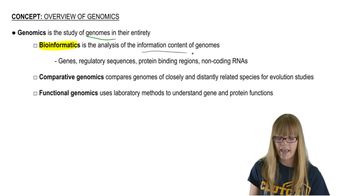Go to the National Institute for Child Health and Human Development (http://www.nichd.nih.gov), locate the search box at the top right corner of the homepage, and enter 'RUSP' to search for information on the Recommended Uniform Screening Panel. From the options that appear, select 'Brief History of Newborn Screening' and locate the discussion listing the criteria for adding a disease to the RUSP list. What are the criteria for listing a disease on the RUSP list?
Table of contents
- 1. Introduction to Genetics51m
- 2. Mendel's Laws of Inheritance3h 37m
- 3. Extensions to Mendelian Inheritance2h 41m
- 4. Genetic Mapping and Linkage2h 28m
- 5. Genetics of Bacteria and Viruses1h 21m
- 6. Chromosomal Variation1h 48m
- 7. DNA and Chromosome Structure56m
- 8. DNA Replication1h 10m
- 9. Mitosis and Meiosis1h 34m
- 10. Transcription1h 0m
- 11. Translation58m
- 12. Gene Regulation in Prokaryotes1h 19m
- 13. Gene Regulation in Eukaryotes44m
- 14. Genetic Control of Development44m
- 15. Genomes and Genomics1h 50m
- 16. Transposable Elements47m
- 17. Mutation, Repair, and Recombination1h 6m
- 18. Molecular Genetic Tools19m
- 19. Cancer Genetics29m
- 20. Quantitative Genetics1h 26m
- 21. Population Genetics50m
- 22. Evolutionary Genetics29m
15. Genomes and Genomics
Bioinformatics
Problem B.8
Textbook Question
Do you think it is important that participation in community-based genetic screening be entirely voluntary? Why or why not?
 Verified step by step guidance
Verified step by step guidance1
Understand the concept of community-based genetic screening, which involves testing individuals within a community to identify genetic conditions or predispositions to diseases.
Consider the ethical principles involved in genetic screening, such as autonomy, informed consent, and privacy, which emphasize that individuals should have the right to make voluntary decisions about their participation.
Reflect on the potential benefits of voluntary participation, including respect for personal choice, increased trust in the screening program, and better psychological outcomes for participants.
Analyze the possible consequences of mandatory participation, such as coercion, loss of individual rights, and potential stigmatization or discrimination based on genetic information.
Formulate your position by weighing the importance of voluntary participation against public health goals, ensuring that ethical standards are maintained while promoting community well-being.
 Verified video answer for a similar problem:
Verified video answer for a similar problem:This video solution was recommended by our tutors as helpful for the problem above
Video duration:
1mPlay a video:
Was this helpful?
Key Concepts
Here are the essential concepts you must grasp in order to answer the question correctly.
Informed Consent
Informed consent is the process by which individuals are fully educated about the benefits, risks, and implications of genetic screening before agreeing to participate. It ensures that participation is voluntary and based on understanding, protecting personal autonomy and ethical standards.
Recommended video:
Guided course

Genomics Overview
Ethical Principles in Genetics
Ethical principles such as autonomy, beneficence, non-maleficence, and justice guide genetic screening practices. Voluntary participation respects individual autonomy, while mandatory screening may raise concerns about coercion and discrimination.
Recommended video:
Guided course

History of Genetics
Community-Based Genetic Screening
Community-based genetic screening involves testing populations to identify genetic risks and prevent disease. While it can improve public health, it must balance benefits with respect for individual rights and cultural sensitivities to avoid stigmatization or loss of privacy.
Recommended video:
Guided course

Base Distortions
Related Videos
Related Practice
Textbook Question
346
views


